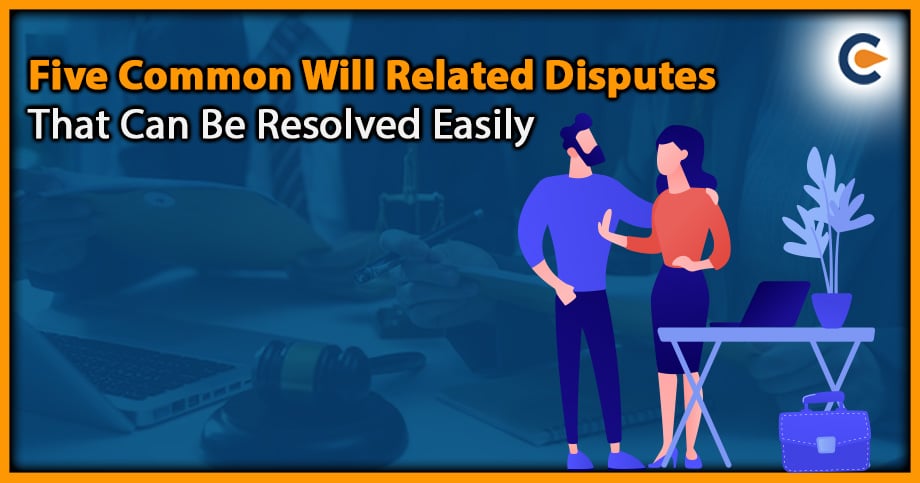A will is a legal document that outlines how a person’s assets will be distributed after their death. While a will is meant to provide clarity and peace of mind for the deceased and their loved ones, disputes can still arise. Will-related disputes can be emotionally and financially draining, but many can be resolved with the help of legal professionals. There are several common will-related disputes that can be resolved relatively easily, such as ambiguity in the will, disputes over assets, executor issues, disputes over validity, and disputes over debts. By seeking legal guidance and working through these disputes in a collaborative manner, beneficiaries can ensure that the deceased’s wishes are carried out as intended and avoid lengthy and costly legal battles.
Following Are Five Common Will Related Disputes That Can Be Resolved Easily:
- Ambiguity In The Will: Ambiguity in a will refers to any unclear, vague or imprecise language or instructions in the document that make it difficult to determine the testator’s (the person who made the will) intentions. This ambiguity can arise due to a variety of reasons such as unclear language, contradictions, omissions or mistakes in the will.
When a will is ambiguous, it can lead to disputes among beneficiaries over how the deceased’s assets should be distributed. For example, if the will specifies that a particular asset should be given to “family members” without providing any further details, it may be unclear who should receive the asset, especially if there are multiple branches of the family.
To resolve an ambiguity in a will, legal professionals may need to interpret the language of the document, and may consult with witnesses or others who can provide insight into the testator’s intentions. In some cases, it may be necessary to go to court and have a judge determine the meaning of the ambiguous language. It is important to address any ambiguities in a will as soon as possible to avoid lengthy and costly legal battles between beneficiaries.
- Disputes over Assets of a Will: Disputes over assets of a will are among the most common disputes that arise in the context of estate planning. Such disputes typically arise when beneficiaries of the will are in disagreement over who should receive which assets from the deceased’s estate.
In some cases, a will may be unclear about how assets should be distributed, which can lead to confusion and disagreements among beneficiaries. For example, a will may specify that a certain asset should be given to “my children”, but it may be unclear whether this refers to all of the testator’s children, or only to a particular group of children. Alternatively, the will may be silent on how certain assets should be distributed, leaving beneficiaries to argue over who should receive them.
- Disputes Over Validity Of A Will: Disputes over the validity of a will arise when one or more parties challenge the legitimacy of the document, typically on the grounds that the will was not executed properly, that the testator did not have the necessary capacity to make a will, or that the testator was under undue influence or coercion when making the will.
For example, a beneficiary may claim that the will was not properly executed according to the legal requirements of the state where the testator lived. This might include situations where the will was not properly signed or witnessed, or where the testator was not of sound mind at the time the will was executed. Alternatively, a beneficiary may argue that the testator was unduly influenced by someone else when making the will, and that the document does not accurately reflect the testator’s true wishes.
To minimize the risk of disputes over the validity of a will, it is important to work with an experienced estate planning attorney when creating and executing a will. An attorney can help ensure that the will is properly executed and that all legal requirements are met, reducing the likelihood of disputes down the line.
- Disputes over Executor: An executor is a person or entity named in a will who is responsible for managing the deceased person’s estate and ensuring that the terms of the will are carried out as intended. Disputes over the executor can arise in a number of ways, including disagreements over the selection of the executor, disputes over the executor’s actions or decisions, or conflicts of interest on the part of the executor.
It is important to choose an executor carefully when creating a will, and to discuss the responsibilities and expectations of the role with the chosen executor ahead of time. This can help minimize the risk of disputes down the line, and ensure that the estate is managed effectively and in accordance with the testator’s wishes.
- Disputes over Debts: Disputes over debts of a will can arise when there are questions about the amount or validity of the debts owed by the deceased person’s estate, or when there is disagreement among beneficiaries over how those debts should be paid.
For example, a beneficiary may challenge the amount of a debt claimed by a creditor, arguing that the debt was inflated or that the deceased person did not owe the full amount. Alternatively, beneficiaries may disagree over how the debts should be paid, with some arguing that certain debts should take priority over others or that certain assets should be sold to pay off debts.
It is important for testators to keep accurate and up-to-date records of their debts and assets to minimize the risk of disputes down the line. Working with an estate planning attorney or financial advisor[1] can help ensure that debts are properly accounted for and that there are clear instructions in the will for how debts should be paid.
Conclusion
While disputes over wills can be complex and emotionally charged, many common issues can be resolved relatively easily with proper communication, negotiation, and legal guidance. By working with experienced professionals and taking steps to address potential areas of conflict ahead of time, such as through careful selection of executors and clear instructions for the distribution of assets, it is possible to minimize the risk of disputes over wills and ensure that the testator’s wishes are carried out as intended. In cases where disputes do arise, it is important to seek expert guidance to ensure that the matter is resolved fairly and in accordance with the law.











